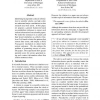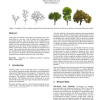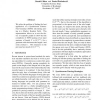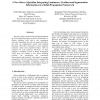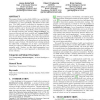ACL
2010
14 years 3 months ago
2010
Identifying background (context) information in scientific articles can help scholars understand major contributions in their research area more easily. In this paper, we propose ...
TOG
2008
14 years 5 months ago
2008
In this paper, we describe a new system for converting a user's freehand sketch of a tree into a full 3D model that is both complex and realistic-looking. Our system does thi...
IVC
2007
14 years 5 months ago
2007
This paper presents an optimisation technique to automatically select a set of control parameters for a Markov Random Field. The method is based on the Reactive Tabu Search strate...
CVIU
2006
14 years 5 months ago
2006
This paper describes how a visual system can automatically define features of interest from the observation of a large enough number of natural images. The principle complements t...
ICMCS
2010
IEEE
14 years 6 months ago
2010
IEEE
In this paper, we propose an unsupervised segmentation algorithm for extracting moving objects/regions from compressed video using Markov Random Field (MRF) classification. First,...
VISAPP
2007
14 years 6 months ago
2007
We consider the problem of image deconvolution. We foccus on a Bayesian approach which consists of maximizing an energy obtained by a Markov Random Field modeling. MRFs are classi...
NAACL
2007
14 years 6 months ago
2007
We relate the problem of finding the best application of a Synchronous ContextFree Grammar (SCFG) rule during parsing to a Markov Random Field. This representation allows us to u...
ICIAP
2007
ACM
14 years 7 months ago
2007
ACM
The paper deals with the design and implementation of a stereo algorithm. Disparity map is formulated as a Markov Random Field with a new smoothness constraint depending not only ...
CISS
2007
IEEE
14 years 7 months ago
2007
IEEE
Abstract –In this paper, a new problem, consensus estimation, is formulated, whose setting is complementary to the well-known CEO problem. In particular, a set of nodes are emplo...
ATAL
2008
Springer
14 years 7 months ago
2008
Springer
We propose Markov random fields (MRFs) as a probabilistic mathematical model for unifying approaches to multi-robot coordination or, more specifically, distributed action selectio...
